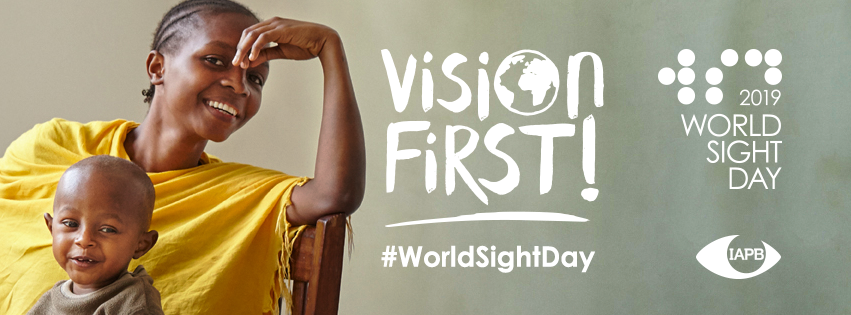
Lifestyle tips from Specsavers for World Sight Day
Today is World Sight Day and a chance to shine a spotlight on how to protect vision and reduce avoidable blindness. With this in mind, we wanted to share some lifestyle tips from Specsavers Ópticas. These are simple things we can all do to keep our eyes healthy and protect our vision.
Get your eyes tested on World Sight Day
Dr Nigel Best, Specsavers clinical spokesperson, says: ‘Vision is our most precious sense and the one people fear losing the most. It deserves care and regular attention. There have been significant advancement in opticians’ ability to diagnose disease and everyone should take advantage of the latest innovations at high street opticians.’ He adds: ‘Regular eye tests combined with some simple wellbeing habits can help reduce the risk of developing certain conditions and make it more likely that any problems are detected early.’
Exercise
It is common knowledge that exercise is good for our overall health, but what is lesser known is that being active is good for our eyes too. Dr Best says: ‘Studies have shown that regular exercise, such as walking, can reduce the risk of age-related macular degeneration by up to 70% and it can also decrease the risk of cataracts too, so staying active is so important.’
The menopause
There are a lot of changes taking place in a woman’s body when she hits the menopause and this can also affect the eyes. ‘Our hormones control the production of our tears and it is common for post-menopausal women to experience dry eye symptoms,’ says Dr Best. ‘If you experience dry, red or gritty eyes you should discuss this with your optometrist so they can advise you on the most appropriate treatment.’
Crying
When we’re feeling down or frustrated it’s not uncommon to feel tears prick our eyes. While many of us may want to hold them back, don’t, as they will do wonders for you. Dr Best explains: ‘When we don’t have enough tears to lubricate our eyes they can become dry and irritated and we can even start to get slightly blurred vision. Tears are so important as they can wash away foreign matter that might come into contact with your eye and they also help reduce the risk of eye infections.’
Eating fish
Eating plenty of fish which is high in omega 3 fatty acids can help with eye lubrication. Dr Best says: ‘When an individual has a dry eye the surface of the eye becomes inflamed. This inflammation further damages the cells which are responsible for tear production, resulting in a vicious circle of increasing inflammation and dryness.
‘It is well documented that omega 3 essential fatty acids have anti-inflammatory effects and therefore may offer some degree of protection against dry eye.
A large epidemiological study in the USA found that women who consumed five servings of tuna per week were at a 68% reduced risk of suffering from dry eyes.’
Sleeping
When we catch some zzzzs it is a time for our body to rest and repair. So when we don’t get enough it can be detrimental to our health. For instance, if you ever feel your eyelids twitching from time to time, you might be experiencing myokymia. Myokimia causes spasms which are often uncomfortable and distracting, and can be caused by lack of sleep. Dr Best says: ‘It’s essential that we all get enough sleep as it gives our bodies an opportunity to rest – including our eye muscles, which will help to stop them from twitching.’
Avocados
The wondrous superfood has been a breakfast staple for millennials everywhere. But rather than just being a tasty way to start the day – and of course providing countless photo opportunities for the ‘gram’ – the trusty avocado is actually great for your eyes too. Dr Best says: ‘Avocados are a huge food trend, which is great news for our eyes. Not only are avocados rich in zinc and vitamin B which help stave off cataracts, but they also have a high amount of lutein. ‘Research suggests lutein is a carotenoid which helps filter out blue light, helping to prevent age-related macular degeneration.’ Enjoy avocados and oily fish today and give your eyes a boost for World Sight Day.
Water
Dehydration can cause symptoms of dry eye so it is really important that we are getting plenty of water throughout the day. Dr Best says: ‘When you lose more fluid than you take in, your body becomes dehydrated. Your eyes can become dry and irritated and you can even start to get slightly blurred vision because there are not enough tears to lubricate the eye.
‘One of the ways to try and combat dry eyes is by rehydrating by drinking plenty of water. Your optician can also recommend eye drops that can help too.’
Make-up
Crashing into bed after a long day or night with your make-up still on is not only bad for your skin but it can also be harmful to your eyes. Dr Best says: ‘Leaving your eye makeup on when you go to sleep – particularly eyeliner and mascara – will increase your chances of getting bacterial and oil build up around your eyes or even inflammation. Make sure you always gently remove beauty products to reduce infection and keep your eyes clean.’
Likewise, it is also important to regularly wash your make-up brushes and ditch out of date products which could be harbouring bacteria.
Your eyes can reveal a lot about your health so it’s really important to have regular eye tests – once every two years, or more often if recommended by your optometrist. To find out more or book your next appointment head to your nearest Specsavers Ópticas store or visit www.specsavers.es
Happy World Sight Day!


